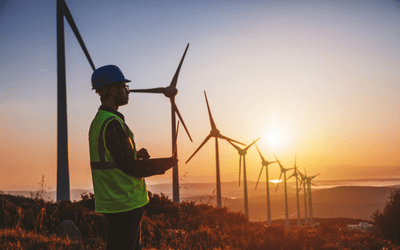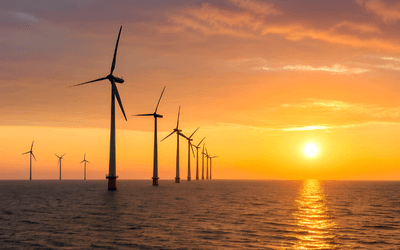Energy is at the forefront of Earth’s climate system, with the ultimate message being clear; to avoid the worst impacts of climate change, we must invest in renewable energy.
As we grasp the ongoing need to combat climate change and reduce the amount of greenhouse gas emissions, the future lies in renewable energy.
Renewable energy resources today make up 26% of the world’s electricity, which is expected to reach 30% by 2024 according to The International Energy Agency (IEA). Renewable energy sources such as solar, hydro, wind and geothermal power are remapping the energy landscape as we see it, with a promising trajectory to renewable energy plans.
The transition from fossil fuels is a challenge which requires materials, systems, and devices efficient for harvesting, conversion, and management of energy, with many researchers investing in machine learning to advance their efforts further. Below are just a few of the many renewable energy sources we will see improving over the next decade.
Solar Energy
Experiencing exponential growth in recent years, solar energy is set to become the largest source of electricity generation by 2050, according to the IEA. With solar energy systems exhibiting lower greenhouse gas emissions and reduced pollution release, it is also reported to become 35% cheaper by 2024, this, coupled with the increase in the efficiency of solar energy, is powering the solar revolution, allowing this energy source to eventually surpass coal and natural gas.
Wind Power
Another key player in the future of renewables is wind power, with both onshore and offshore wind energy projects expected to increase. Ambitious projects are planned for the UK and US, with onshore wind energy capacity increasing by 57% in 2024 and offshore wind capacity to grow to 234 GW by 2030, according to the GWEC, significantly contributing to clean energy goals.
Hydroelectric Power
Water-generated power remains to be a reliable and sustainable method of sourcing energy. It is estimated that the global installed hydropower capacity reached 1,308 GW in 2020 reported by The International Hydropower Association (IHA), which is expected to rise a further 9% by 2024. With innovative technologies like pumped storage hydroelectricity emerging, hydropower is an essential part of the renewable energy future.
Geothermal energy
Derived from the Earth’s heat, geothermal energy is a source of energy often underestimated. It is reported that geothermal capacity is expected to grow to 18 GW by 2030 as stated by The Geothermal Energy Association (GEA), with an increase of 28% by 2024, with binary cycle power plants and enhanced geothermal systems being among the emerging technologies which predict to unlock this power sources full potential.
Green Hydrogen
Another renewable energy source contributing to the reach of net zero by 2050 is green hydrogen. Green hydrogen is a clean and viable solution to renewable energy, which recently doubled national targets for low carbon hydrogen production capacity to 10 GW by 2030.
The challenges we face with green hydrogen production are finding new technologies to meet large-scale projects. This industry has many major energy providers and distributors looking into green hydrogen to back their efforts in natural gas production over oil and coal.
Battery Energy Storage Systems
One last solution to note is battery energy storage systems (BESS), which are playing an increasingly important role in the energy crisis. BESS can optimise wind and solar generation while also enhancing the grid’s capacity to deal with energy surges in peak demand. In Ireland, Fluence and Statkraft have partnered on the market’s first 4-hour battery energy storage system.
The future of renewable energy is promising, with hydroelectric, geothermal, solar, BESS, green hydrogen and wind energy technologies sitting at the forefront of the energy revolution. The transformation to a more renewably driven world is in sight, with a more sustainable future for our planet.
If you are thinking of a career in renewable energy, we are proud to specialise in this area. You can find all energy and renewable jobs here.
Sources:
Energy Policy & Economics Solutions “What the Future of Renewable Energy Looks Like”
Energy Storage News “Fluence and Statkraft to build Ireland’s first 4-hour BESS”
Global Wind Energy Council “Global Wind Report 2021”
Geothermal Energy Association “2020 Annual US and Global Geothermal Power Production Report”
Open Access Government “Why green hydrogen energy is more in focus now than ever before”
International Energy Agency “World Energy Outlook 2020”
International Hydropower Association “2020 Hydropower Status Report”
Interesting Engineering “From rays to watts: The ultimate guide to solar energy”









